Unit 1 Where did you go on vacation?Section A(Grammar_Focus-3c)一般过去时复习课件(46张PPT)
文档属性
| 名称 | Unit 1 Where did you go on vacation?Section A(Grammar_Focus-3c)一般过去时复习课件(46张PPT) |
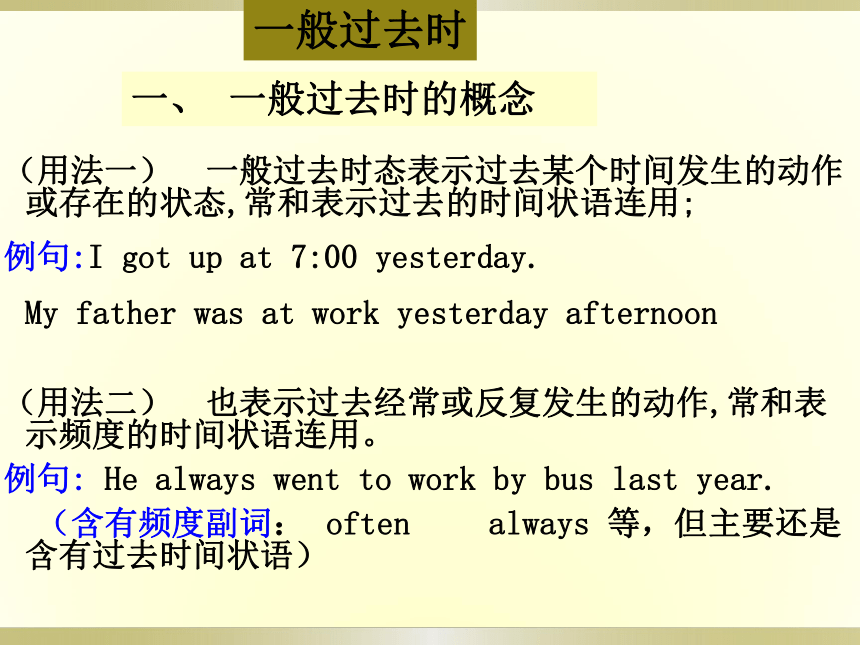
|
|
| 格式 | zip | ||
| 文件大小 | 2.9MB | ||
| 资源类型 | 教案 | ||
| 版本资源 | 人教新目标(Go for it)版 | ||
| 科目 | 英语 | ||
| 更新时间 | 2018-09-25 00:00:00 | ||
图片预览

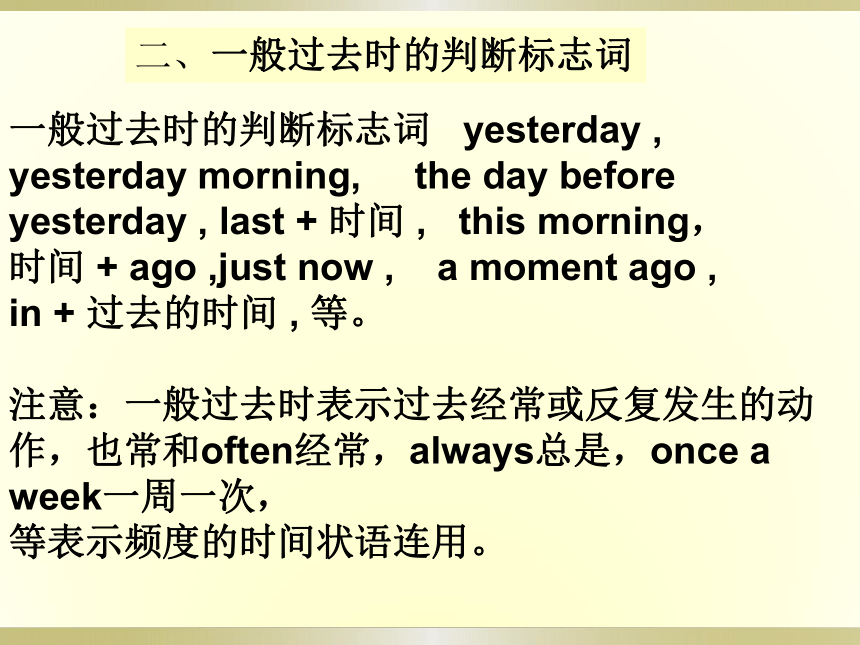
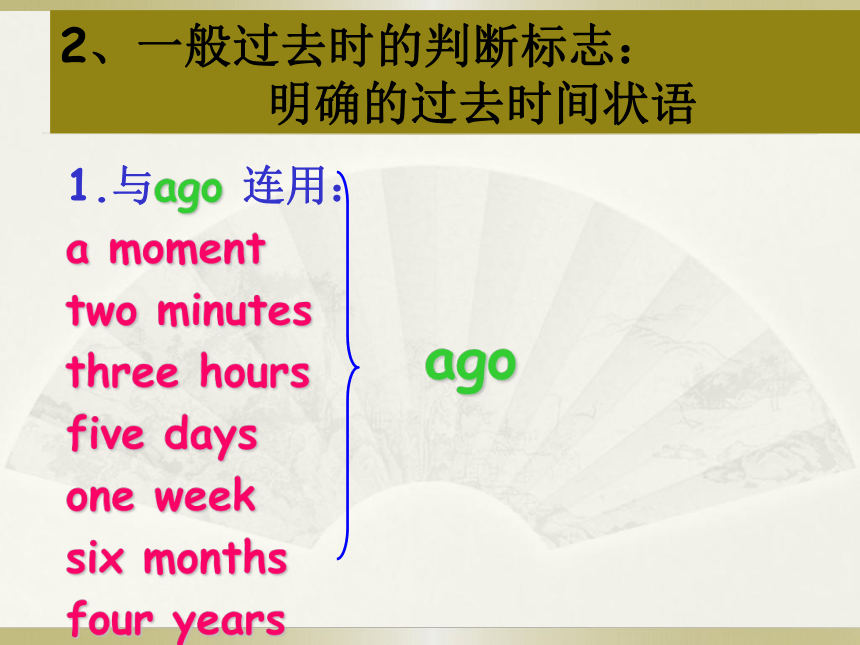
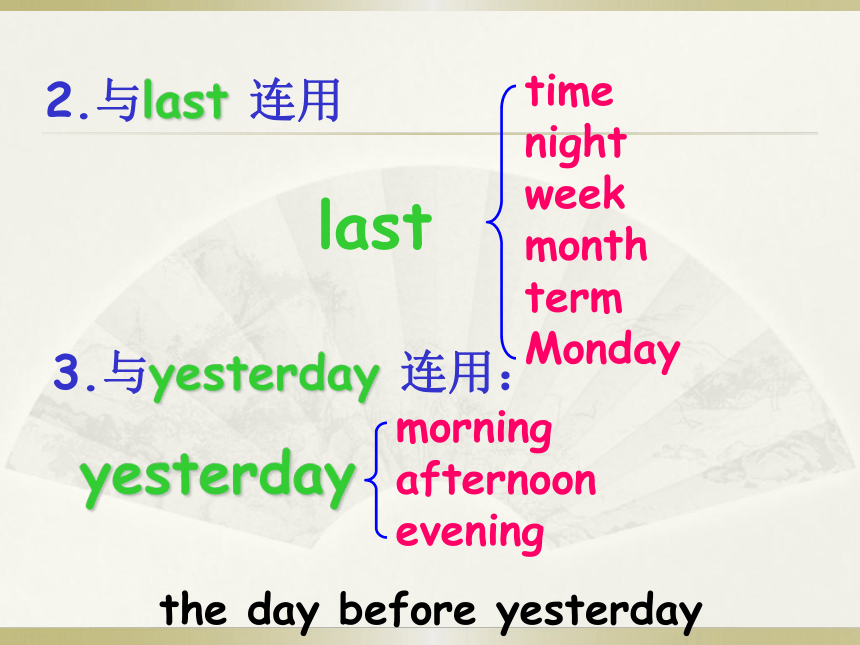
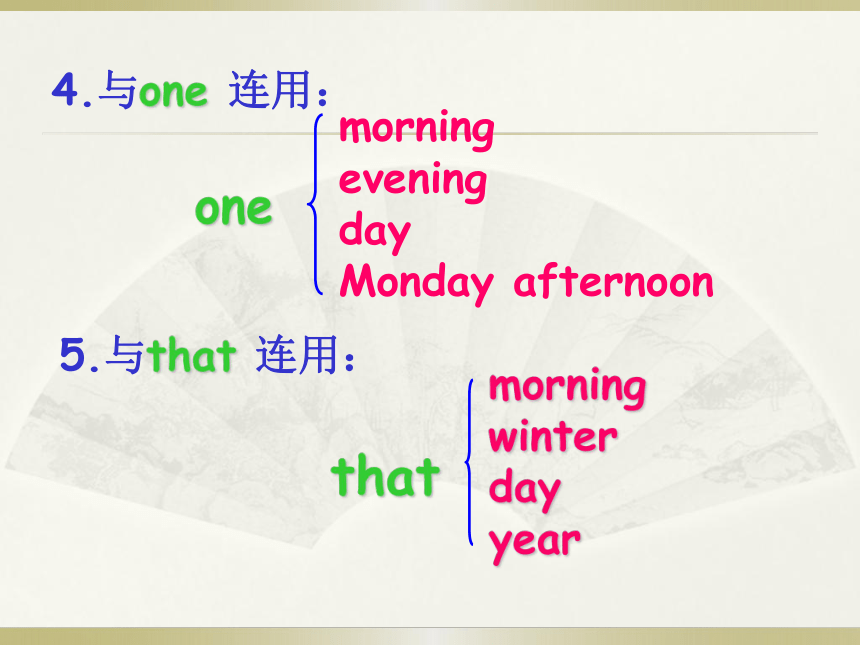
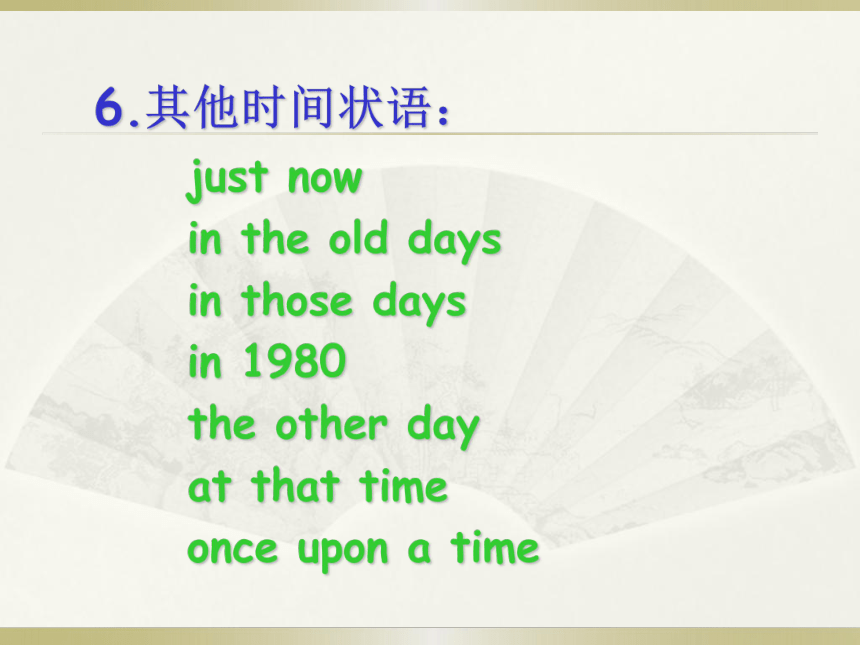
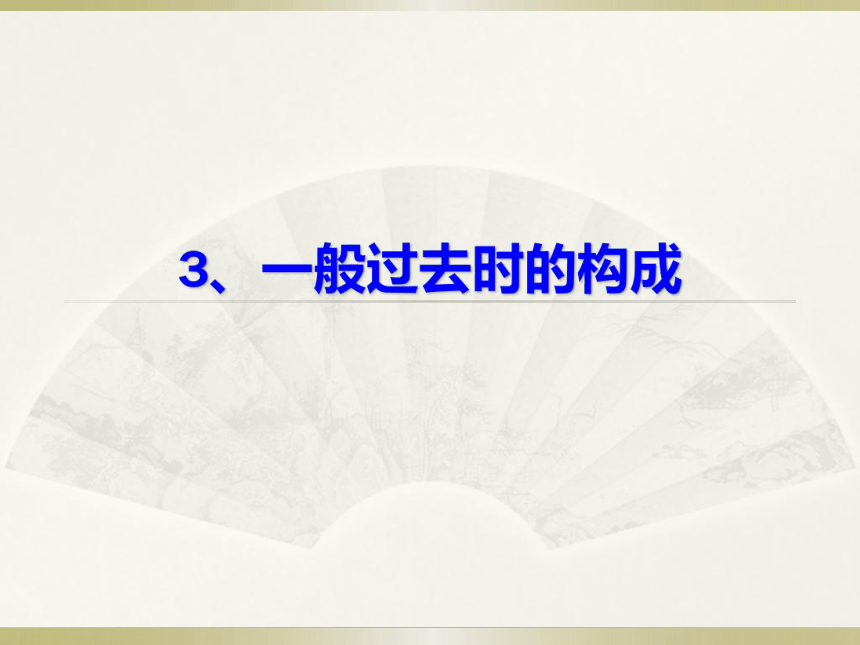
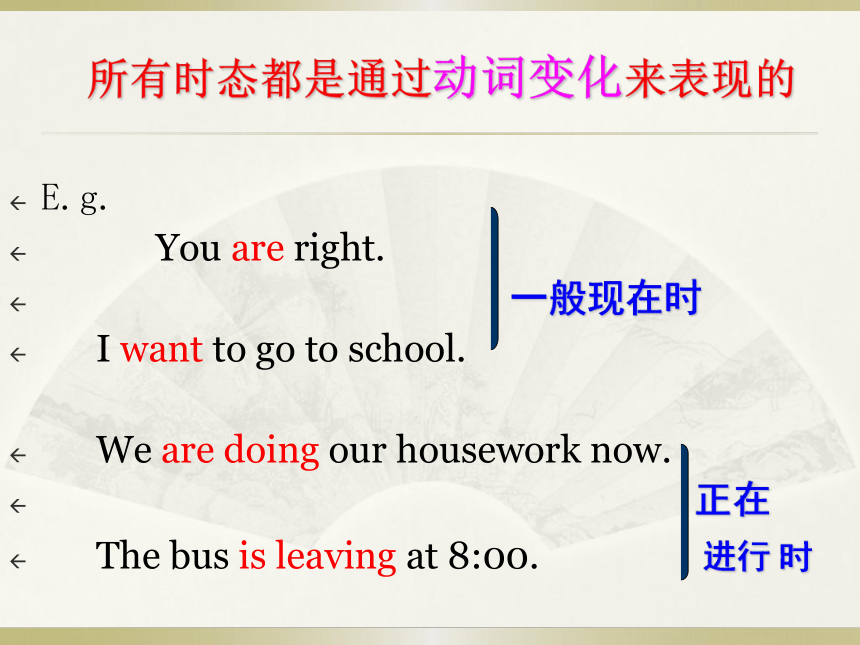
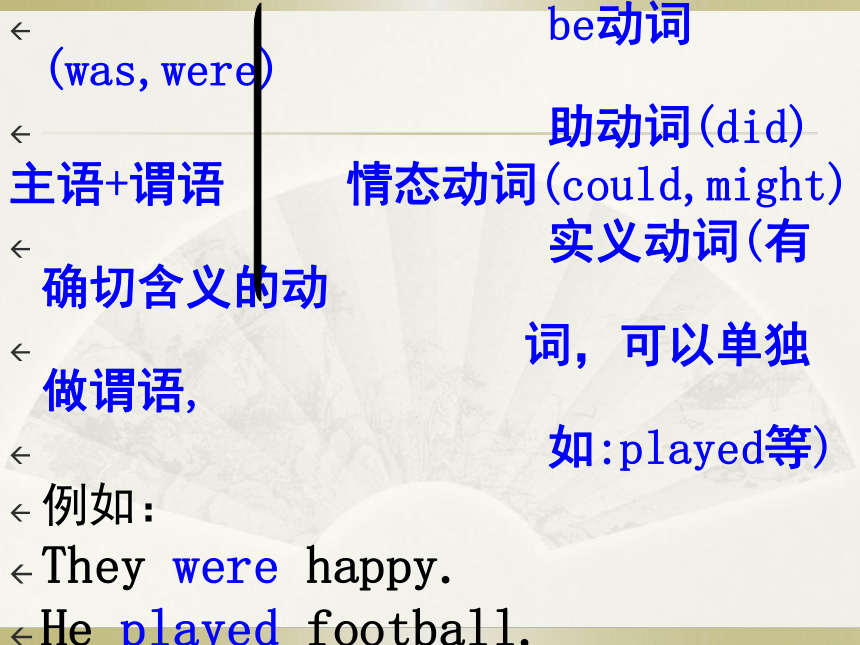
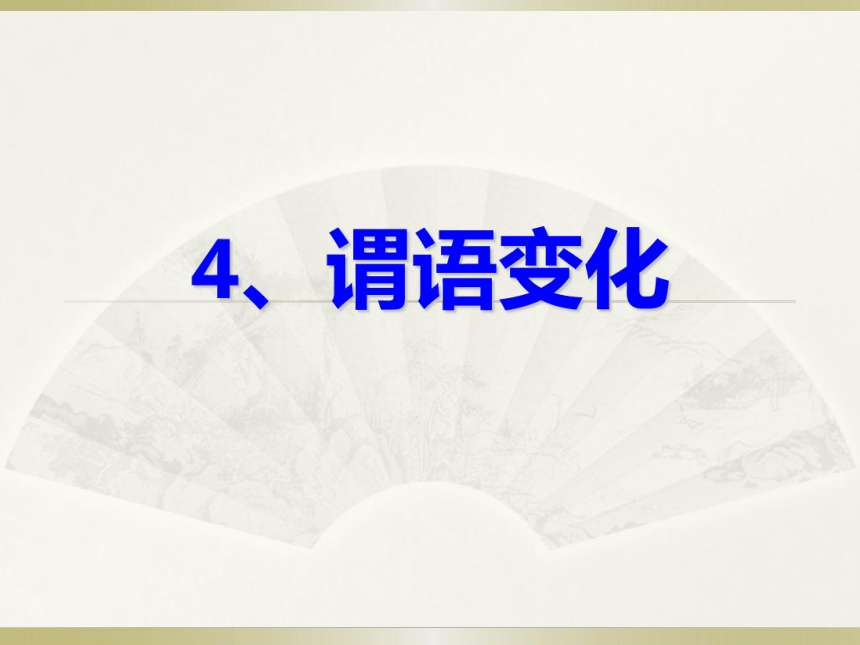
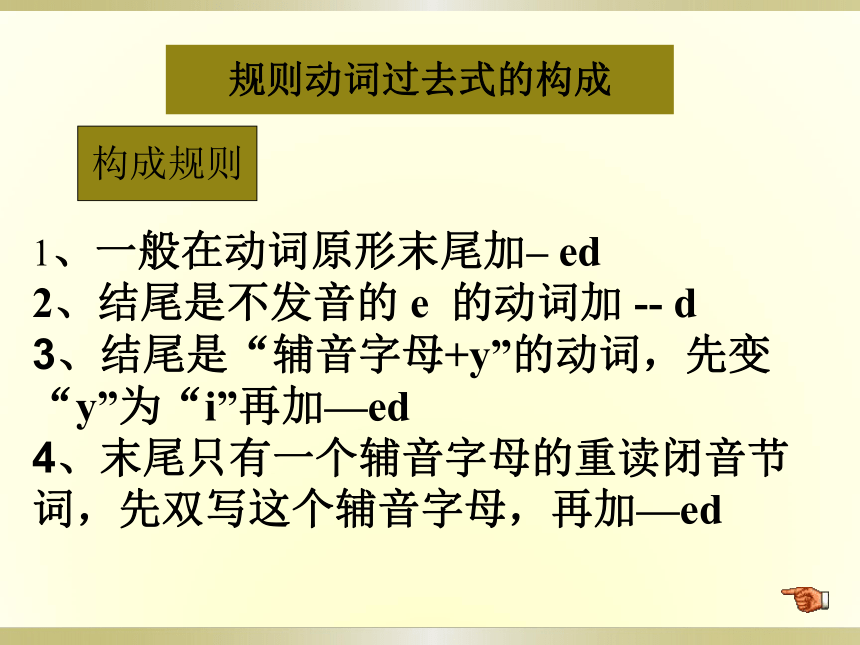
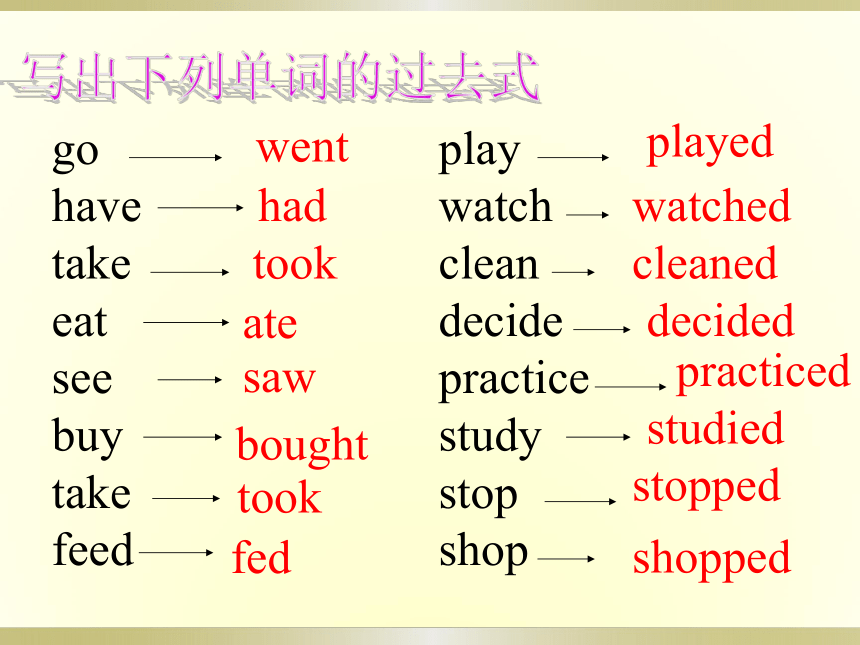
文档简介
(用法一) 一般过去时态表示过去某个时间发生的动作或存在的状态,常和表示过去的时间状语连用;
例句:I got up at 7:00 yesterday.
My father was at work yesterday afternoon
(用法二) 也表示过去经常或反复发生的动作,常和表示频度的时间状语连用。
例句: He always went to work by bus last year.
(含有频度副词: often always 等,但主要还是含有过去时间状语)
一般过去时
一、 一般过去时的概念 ????
一般过去时的判断标志词 yesterday ,
yesterday morning, the day before yesterday , last + 时间 , this morning,
时间 + ago ,just now , a moment ago ,
in + 过去的时间 , 等。
注意:一般过去时表示过去经常或反复发生的动作,也常和often经常,always总是,once a week一周一次,
等表示频度的时间状语连用。
二、一般过去时的判断标志词
1.与ago 连用:
a moment
two minutes
three hours
five days
one week
six months
four years
ago
2、一般过去时的判断标志:
明确的过去时间状语
last
time
night
week
month
term
Monday
yesterday
morning
afternoon
evening
the day before yesterday
2.与last 连用
3.与yesterday 连用:
4.与one 连用:
one
morning
evening
day
Monday afternoon
5.与that 连用:
that
morning
winter
day
year
just now
in the old days
in those days
in 1980
the other day
at that time
once upon a time
6.其他时间状语:
3、一般过去时的构成
所有时态都是通过动词变化来表现的
E.g.
You are right.
一般现在时
I want to go to school.
We are doing our housework now.
正在
The bus is leaving at 8:00. 进行 时
be动词(was,were)
助动词(did)
主语+谓语 情态动词(could,might)
实义动词(有确切含义的动
词,可以单独做谓语,
如:played等)
例如:
They were happy.
He played football.
You did your homework.
4、谓语变化
规则动词过去式的构成
构成规则
1、一般在动词原形末尾加– ed
2、结尾是不发音的 e 的动词加 -- d
3、结尾是“辅音字母+y”的动词,先变“y”为“i”再加—ed
4、末尾只有一个辅音字母的重读闭音节词,先双写这个辅音字母,再加—ed
go
have
take
eat
see
buy
take
feed
went
had
took
ate
saw
bought
play
watch
clean
decide
practice
study
stop
shop
played
watched
cleaned
decided
practiced
studied
stopped
shopped
took
fed
规则动词过去式词尾-ed的读音
读音规则 读 音 例 词
在清辅音后面 /t/ passed /pa:st/
在浊辅音和元音后面
/d/ moved /mu:vd/
在t ,d后面 /id/ needed /’ni:did/
1. Be动词的一般过去时?
肯定句式:主语 + was / were + 其它.?
否定句式:主语 + wasn’t /weren’t+ 其它.?
一般疑问句:Was/Were + 主语 + 其它?
肯定回答:Yes,主语+ was / were .
否定回答:No,主语+ wasn’t /weren’t.
特殊疑问句
特殊疑问词 +was / were + 主语 +其他成分
When and where were you born?
____ ____he late for school last Monday?
他上周一为什么上学迟到了?
wasn’t=was not
weren’t=were not
am/is ---was are---were?
五、一般过去时的结构(可分三类不同的结构)
Why
was
2. 行为动词(v.)的一般过去时态 ?
肯定句式:主语 + v-ed+ 其它.
否定句式:主语 + didn’t + v原形+ 其它.
一般疑问句:Did + 主语+ v.原形+ 其它?
肯定回答:Yes,主语+did.
否定回答:No,主语+did’t.
【do , does---did】
【did not = didn’t】?
特殊疑问句
特殊疑问词 +did + 主语 +行为动词原形
eg. - Did you go shopping yesterday?
?注意:1.? did和didn’t 是构成一般过去时的助动词,
其特点是要在其后跟动词的原形。
?? ?? 2.? 实意动词do的一般过去时?
I? do ?my? homework? every day.(用yesterday改写句子)
I? ____my? homework? yesterday.
I? _________?my? homework? yesterday.(否定句)
____?you ?____ ?your? homework? yesterday?
Yes ,I did.?? /No, ?I didn’t.(一般疑问句)
They ______ (have) a good time yesterday.
They ___________ (not watch) TV last night.
____ you _____ (go) to the park yesterday?
Yes, I____. / _____, I didn’t.
had
didn’t watch
Did
go
did
No
did ?
didn’t do
Did
do
3. 情态动词的一般过去时态 ?
肯定句式:主语 + 情态动词的过去式 +v原型+ 其它.
否定句式:主语 + 情态动词的过去式 + not +v原型 + 其它.?
一般疑问句:情态动词的过去式 + 主语 + v原型+ 其它??
注:情态动词的过去式:can→_____ , may→______,
must→_____ ,will-______,shall-______。?
特殊疑问句式:
特殊疑问词+情态助动词过去式+主语+v.原形+其他?
_____ ______she ____twenty years ago?
20年前她能做什么?
?
特殊疑问词+ 一般疑问句?
could
do
What
could
might
must
would
should
① 表示过去某个时间发生的动作或存在的状态。
? My father _______in Shanghai last year.
我爸爸去年在上海工作。
②表示过去的习惯性或经常发生的动作,常和often经常,
always总是,once a week一周一次,等表示频度的时间
状语连用。
I often _____________on foot.(过去)我经常步行去上学。
③与when等连词引导的?状语从句连用。
When she got home,she _____a short rest.
当她到家时,她稍微休息了一下。
六、 一般过去时的基本用法
worked
went to school
had
巧记动词过去时态
动词一般过去时,表示过去发生的事;
be用was或用were, have,has变had;
谓语动词过去式,过去时间作标志;
一般动词加-ed,若是特殊得硬记。
否定句很简单,主语之后didn’t添;
疑问句也不难,did放在主语前;
如果谓语之前有did,谓语动词需还原;
动词若是was, were,否定其后not添。
1. some, any, no, every与-one, -thing可以
组成八个不定代词,他们分别是:
someone
复合不定代词小结:
anyone
no one
everyone
something
anything
nothing
everything
某人 某事
任何人 任何事
没有人 没有东西
每人 一切
2. 带some的复合不定代词常用于肯定句
中;带any的复合不定代词常用于否定
句或一般疑问句中。例如:
我想吃点东西。
I’d like ___________ to eat.
今天有人给我打电话吗?
Did ________ call me today?
anyone
something
3. 当形容词修饰不定代词时,应放在其
后面。例如:
这本书里有什么新东西吗?
Is there _________ _____ in this
book?
今天没有什么特别的事。
There’s _________ ________ today.
anything new
nothing special
4. 由some, any, no, every构成的复合不定
代词作主语时,都作单数看待,其谓
语动词用单数第三人称形式。例如:
Something is wrong with my watch.
Well, everyone wants to win.
Nobody knows what the future will be
like.
There is something for everyone at
Green Park.
5. 除no one以外,其他复合不定代词都
写成一个词。
1. 你去了什么地方去度假?
______ ______ you go on _________?
2. 我去了纽约市。
I _______ ____ New York City.
3. 你和别的什么人一起去的吗?
______ ______ go out with ________?
vacation
Where did
went to
Did you
anyone
根据课本内容,完成下列句子。
4. 不,没有别人在这儿。每个人都在度假。
No. ____ _____ was here.
________ was on ________.
5. 你买了什么特别的东西了吗?
_____ you buy ________ _______?
6. 是的,我为我爸爸买了些东西。
Yes, I _______ _________ for my father.
7. 不,我没有买什么东西。
No, I _______ _________.
No one
Everyone
vacation
anything special
Did
bought something
bought nothing
8. 吃的怎么样?____ ____ the food?
9. 所有的东西尝起来都很好。
__________ _______ really good.
10. 每个人都玩得很开心吗?
_____ ________ have a good time?
11. 是的。一切事物都很棒。
Yes. ____________ was excellent.
How was
Everything tasted
Did everyone
Everything
Grammar
Focus
Where did you go on
vacation?
I went to New York City.
Did you go out with
anyone?
Did you buy anything
special?
No. No one was here.
Everyone was on vacation.
Yes, I bought sth for my father.
No, I bought nothing.
Did everyone have a
good time?
Oh, yes. Everything was
excellent.
Everything tasted really good!
熟读句子
How was the food?
3a
Fill in the blanks with the words in the box and practice the conversation.
方法指导:
首先,应通读对话,掌握短文大意;其次,回顾一下复合不定代词的用法。然后,仔细阅读每个句子,根据空格前后的词语进行推敲。比如,第一句话是一个一般疑问句,空格前有do一词,可知空格处应填anything一词,意为“做什么事情”。其他类似。
anyone, something, anything, everything, nothing
Linda: Did you do _________ fun on your
vacation, Alice?
Alice: Yes, I did. I went to Sanya.
Linda: How did you like it?
Alice: Well, it was my first time there, so
__________ was really interesting.
anything
everything
Linda: Did you go with ________?
Alice: Yes, I did. I went with my sister.
Linda: Did you go shopping?
Alice: Of course! I bought _________
for my parents, but _________ for
myself.
anyone
anyone, something, anything, everything, nothing
something
nothing
pron. 当然;自然
当然;自然
Linda: Why didn’t you buy ________ for
yourself?
Alice: I didn’t really see _________ I like.
anything
anything
anyone, something, anything, everything, nothing
pron. 你自己;您自己
anything, everything, nothing, everyone,
no one
Fill in the blanks in the e-mail message with the words in the box.
3b
Dear Bill,
How was your vacation? Did you do ________ interesting? Did _______ in the family go with you?
anything
anyone
I went to a friend’s farm in the countryside with my family. __________ was great. We fed some hens and saw some baby pigs. They were so cute! The only problem was that there was _______ much to do in the evening but read. Still ______ seemed to be bored. Bye for now!
Mark
Everything
anything, everything, nothing, everyone, no one
nothing
no one
v. 好像;似乎;看来
n. 猪
n. 母鸡
adj. 厌倦的;烦闷的
1. myself (我自己) ,yourself (你自己)是反
身代词。表示“某人自己的词”叫反身代
词。见下表:
myself yourself himself herself itself
我自己 你自己 他自己 她自己 它自己
ourselves yourselves themselves
我们自己 你们自己 他们自己
1) Did you buy anything for yourself?
你为你自己买什么东西了吗?(做介词宾语)
2) The old man taught himself English.
那位老人自学英语。(做动词宾语)
3) The thing itself is not important.
事情本身并不重要。(做同位语)
4) I myself visited my aunt last weekend.
上周我自己去拜访了姑姑。(做同位语)
2. How did you like it?
? ? 句型How ... sb. like ...?与What ... sb. think of ...?同义,意为“某人觉得……怎么样?”。如:
How do you like the TV show?
= ____________________ the TV show?
你觉得这个电视节目怎么样?
What do you think of
3. Still no one seemed to be bored.
seem意为“好像;似乎;看来”,其主要用法如下:
◆seem+ (to be) + adj. 如:
The movie _______________________.
这部电影似乎很有趣。
◆seem to do sth. 如:
The boy _____________ nothing about it. 这个男孩似乎对它一无所知。
seems (to be) interesting
seems to know
◆It seems that ... 如:
It seems that Mr. Zhang is at home.
张先生好像在家。
据汉语意思完成英语句子。
1) 这儿的衣服似乎很贵。
The clothes here ___________ very expensive.
2) 他们似乎周六要去上海。
They seem _______ to Shanghai on Saturday.
3) 好像今天她要开车去上班。
_____________ she’ll drive to work today.
seem to be
to go?
It seems that
The (only) problem is /was that…
(唯一)的问题是……(表语从句)
问题是Tom没有钱。
The problem is that Tom has no money.
唯一的问题是今天的报纸上没有什么有趣的东西。
The only problem is that there is nothing interesting in today’s newspaper.
问题是你昨天没完成作业。
The problem was that you didn’t finish your homework.
问题是Lily每天无所事事。
The problem is that Lily has nothing much to do every day.
选词填空
something, anyone, everything, anything, nothing, someone, no one, every one
_________ found Mr. Li’s keys and gave them back to him yesterday.
2. ─Did you see _________ in the big box?
─ No, I didn’t. There’s _______ in it.
_________ helped the little boy. He did it himself.
nothing
Someone
No one
anything
4. My watch doesn’t work. ___________ is wrong with it.
5. ─Hello, ___________!
─Hello, Mr. Smith!
6. ─How’s it going, Jack?
─Great! ____________ is going well.
7. ─Did you go to the beach with
_______?
─Yes. I went there with my cousin.
anyone
Everything
everyone
Something
Ask your group questions about their last vacation. Then tell the class your results.
3c
n. 日记;记事薄
Did you… Everyone Someone (name) No one
eat anything at a restaurant?
read anything interesting?
visit anyone in your family?
buy anything?
keep a diary?
In our group, everyone ate something at a restaurant. No one read anything interesting. Li Lei visited his grandparents in the town. Liu Xue bought something interesting. Xu Li kept a diary.
Now work by yourselves. Then give your own report on your group.
Reading and Writing: write the questions.
1.Q: (you/vacation)_____________________________________
A: I went to the beach.
2. Q: (your sister/beach)_________________________________
A:: No, she didn’t. She stayed at home.
3. Q: (Julie/ her uncle)________________________________
A: Yes, she visited her uncle in New York City.
4.Q: (your parents/museums)_____________________________
A: No, they didn’t. They don’t like museums.
5. Q:(your parents/museums)_____________________________
A: They visited a lot of museums. The museums were interesting.
Where did you go on vacation?
Did your sister go to the beach?
Did Julie visit her uncle?
Did your parents visit museums?
What did your parents do?
例句:I got up at 7:00 yesterday.
My father was at work yesterday afternoon
(用法二) 也表示过去经常或反复发生的动作,常和表示频度的时间状语连用。
例句: He always went to work by bus last year.
(含有频度副词: often always 等,但主要还是含有过去时间状语)
一般过去时
一、 一般过去时的概念 ????
一般过去时的判断标志词 yesterday ,
yesterday morning, the day before yesterday , last + 时间 , this morning,
时间 + ago ,just now , a moment ago ,
in + 过去的时间 , 等。
注意:一般过去时表示过去经常或反复发生的动作,也常和often经常,always总是,once a week一周一次,
等表示频度的时间状语连用。
二、一般过去时的判断标志词
1.与ago 连用:
a moment
two minutes
three hours
five days
one week
six months
four years
ago
2、一般过去时的判断标志:
明确的过去时间状语
last
time
night
week
month
term
Monday
yesterday
morning
afternoon
evening
the day before yesterday
2.与last 连用
3.与yesterday 连用:
4.与one 连用:
one
morning
evening
day
Monday afternoon
5.与that 连用:
that
morning
winter
day
year
just now
in the old days
in those days
in 1980
the other day
at that time
once upon a time
6.其他时间状语:
3、一般过去时的构成
所有时态都是通过动词变化来表现的
E.g.
You are right.
一般现在时
I want to go to school.
We are doing our housework now.
正在
The bus is leaving at 8:00. 进行 时
be动词(was,were)
助动词(did)
主语+谓语 情态动词(could,might)
实义动词(有确切含义的动
词,可以单独做谓语,
如:played等)
例如:
They were happy.
He played football.
You did your homework.
4、谓语变化
规则动词过去式的构成
构成规则
1、一般在动词原形末尾加– ed
2、结尾是不发音的 e 的动词加 -- d
3、结尾是“辅音字母+y”的动词,先变“y”为“i”再加—ed
4、末尾只有一个辅音字母的重读闭音节词,先双写这个辅音字母,再加—ed
go
have
take
eat
see
buy
take
feed
went
had
took
ate
saw
bought
play
watch
clean
decide
practice
study
stop
shop
played
watched
cleaned
decided
practiced
studied
stopped
shopped
took
fed
规则动词过去式词尾-ed的读音
读音规则 读 音 例 词
在清辅音后面 /t/ passed /pa:st/
在浊辅音和元音后面
/d/ moved /mu:vd/
在t ,d后面 /id/ needed /’ni:did/
1. Be动词的一般过去时?
肯定句式:主语 + was / were + 其它.?
否定句式:主语 + wasn’t /weren’t+ 其它.?
一般疑问句:Was/Were + 主语 + 其它?
肯定回答:Yes,主语+ was / were .
否定回答:No,主语+ wasn’t /weren’t.
特殊疑问句
特殊疑问词 +was / were + 主语 +其他成分
When and where were you born?
____ ____he late for school last Monday?
他上周一为什么上学迟到了?
wasn’t=was not
weren’t=were not
am/is ---was are---were?
五、一般过去时的结构(可分三类不同的结构)
Why
was
2. 行为动词(v.)的一般过去时态 ?
肯定句式:主语 + v-ed+ 其它.
否定句式:主语 + didn’t + v原形+ 其它.
一般疑问句:Did + 主语+ v.原形+ 其它?
肯定回答:Yes,主语+did.
否定回答:No,主语+did’t.
【do , does---did】
【did not = didn’t】?
特殊疑问句
特殊疑问词 +did + 主语 +行为动词原形
eg. - Did you go shopping yesterday?
?注意:1.? did和didn’t 是构成一般过去时的助动词,
其特点是要在其后跟动词的原形。
?? ?? 2.? 实意动词do的一般过去时?
I? do ?my? homework? every day.(用yesterday改写句子)
I? ____my? homework? yesterday.
I? _________?my? homework? yesterday.(否定句)
____?you ?____ ?your? homework? yesterday?
Yes ,I did.?? /No, ?I didn’t.(一般疑问句)
They ______ (have) a good time yesterday.
They ___________ (not watch) TV last night.
____ you _____ (go) to the park yesterday?
Yes, I____. / _____, I didn’t.
had
didn’t watch
Did
go
did
No
did ?
didn’t do
Did
do
3. 情态动词的一般过去时态 ?
肯定句式:主语 + 情态动词的过去式 +v原型+ 其它.
否定句式:主语 + 情态动词的过去式 + not +v原型 + 其它.?
一般疑问句:情态动词的过去式 + 主语 + v原型+ 其它??
注:情态动词的过去式:can→_____ , may→______,
must→_____ ,will-______,shall-______。?
特殊疑问句式:
特殊疑问词+情态助动词过去式+主语+v.原形+其他?
_____ ______she ____twenty years ago?
20年前她能做什么?
?
特殊疑问词+ 一般疑问句?
could
do
What
could
might
must
would
should
① 表示过去某个时间发生的动作或存在的状态。
? My father _______in Shanghai last year.
我爸爸去年在上海工作。
②表示过去的习惯性或经常发生的动作,常和often经常,
always总是,once a week一周一次,等表示频度的时间
状语连用。
I often _____________on foot.(过去)我经常步行去上学。
③与when等连词引导的?状语从句连用。
When she got home,she _____a short rest.
当她到家时,她稍微休息了一下。
六、 一般过去时的基本用法
worked
went to school
had
巧记动词过去时态
动词一般过去时,表示过去发生的事;
be用was或用were, have,has变had;
谓语动词过去式,过去时间作标志;
一般动词加-ed,若是特殊得硬记。
否定句很简单,主语之后didn’t添;
疑问句也不难,did放在主语前;
如果谓语之前有did,谓语动词需还原;
动词若是was, were,否定其后not添。
1. some, any, no, every与-one, -thing可以
组成八个不定代词,他们分别是:
someone
复合不定代词小结:
anyone
no one
everyone
something
anything
nothing
everything
某人 某事
任何人 任何事
没有人 没有东西
每人 一切
2. 带some的复合不定代词常用于肯定句
中;带any的复合不定代词常用于否定
句或一般疑问句中。例如:
我想吃点东西。
I’d like ___________ to eat.
今天有人给我打电话吗?
Did ________ call me today?
anyone
something
3. 当形容词修饰不定代词时,应放在其
后面。例如:
这本书里有什么新东西吗?
Is there _________ _____ in this
book?
今天没有什么特别的事。
There’s _________ ________ today.
anything new
nothing special
4. 由some, any, no, every构成的复合不定
代词作主语时,都作单数看待,其谓
语动词用单数第三人称形式。例如:
Something is wrong with my watch.
Well, everyone wants to win.
Nobody knows what the future will be
like.
There is something for everyone at
Green Park.
5. 除no one以外,其他复合不定代词都
写成一个词。
1. 你去了什么地方去度假?
______ ______ you go on _________?
2. 我去了纽约市。
I _______ ____ New York City.
3. 你和别的什么人一起去的吗?
______ ______ go out with ________?
vacation
Where did
went to
Did you
anyone
根据课本内容,完成下列句子。
4. 不,没有别人在这儿。每个人都在度假。
No. ____ _____ was here.
________ was on ________.
5. 你买了什么特别的东西了吗?
_____ you buy ________ _______?
6. 是的,我为我爸爸买了些东西。
Yes, I _______ _________ for my father.
7. 不,我没有买什么东西。
No, I _______ _________.
No one
Everyone
vacation
anything special
Did
bought something
bought nothing
8. 吃的怎么样?____ ____ the food?
9. 所有的东西尝起来都很好。
__________ _______ really good.
10. 每个人都玩得很开心吗?
_____ ________ have a good time?
11. 是的。一切事物都很棒。
Yes. ____________ was excellent.
How was
Everything tasted
Did everyone
Everything
Grammar
Focus
Where did you go on
vacation?
I went to New York City.
Did you go out with
anyone?
Did you buy anything
special?
No. No one was here.
Everyone was on vacation.
Yes, I bought sth for my father.
No, I bought nothing.
Did everyone have a
good time?
Oh, yes. Everything was
excellent.
Everything tasted really good!
熟读句子
How was the food?
3a
Fill in the blanks with the words in the box and practice the conversation.
方法指导:
首先,应通读对话,掌握短文大意;其次,回顾一下复合不定代词的用法。然后,仔细阅读每个句子,根据空格前后的词语进行推敲。比如,第一句话是一个一般疑问句,空格前有do一词,可知空格处应填anything一词,意为“做什么事情”。其他类似。
anyone, something, anything, everything, nothing
Linda: Did you do _________ fun on your
vacation, Alice?
Alice: Yes, I did. I went to Sanya.
Linda: How did you like it?
Alice: Well, it was my first time there, so
__________ was really interesting.
anything
everything
Linda: Did you go with ________?
Alice: Yes, I did. I went with my sister.
Linda: Did you go shopping?
Alice: Of course! I bought _________
for my parents, but _________ for
myself.
anyone
anyone, something, anything, everything, nothing
something
nothing
pron. 当然;自然
当然;自然
Linda: Why didn’t you buy ________ for
yourself?
Alice: I didn’t really see _________ I like.
anything
anything
anyone, something, anything, everything, nothing
pron. 你自己;您自己
anything, everything, nothing, everyone,
no one
Fill in the blanks in the e-mail message with the words in the box.
3b
Dear Bill,
How was your vacation? Did you do ________ interesting? Did _______ in the family go with you?
anything
anyone
I went to a friend’s farm in the countryside with my family. __________ was great. We fed some hens and saw some baby pigs. They were so cute! The only problem was that there was _______ much to do in the evening but read. Still ______ seemed to be bored. Bye for now!
Mark
Everything
anything, everything, nothing, everyone, no one
nothing
no one
v. 好像;似乎;看来
n. 猪
n. 母鸡
adj. 厌倦的;烦闷的
1. myself (我自己) ,yourself (你自己)是反
身代词。表示“某人自己的词”叫反身代
词。见下表:
myself yourself himself herself itself
我自己 你自己 他自己 她自己 它自己
ourselves yourselves themselves
我们自己 你们自己 他们自己
1) Did you buy anything for yourself?
你为你自己买什么东西了吗?(做介词宾语)
2) The old man taught himself English.
那位老人自学英语。(做动词宾语)
3) The thing itself is not important.
事情本身并不重要。(做同位语)
4) I myself visited my aunt last weekend.
上周我自己去拜访了姑姑。(做同位语)
2. How did you like it?
? ? 句型How ... sb. like ...?与What ... sb. think of ...?同义,意为“某人觉得……怎么样?”。如:
How do you like the TV show?
= ____________________ the TV show?
你觉得这个电视节目怎么样?
What do you think of
3. Still no one seemed to be bored.
seem意为“好像;似乎;看来”,其主要用法如下:
◆seem+ (to be) + adj. 如:
The movie _______________________.
这部电影似乎很有趣。
◆seem to do sth. 如:
The boy _____________ nothing about it. 这个男孩似乎对它一无所知。
seems (to be) interesting
seems to know
◆It seems that ... 如:
It seems that Mr. Zhang is at home.
张先生好像在家。
据汉语意思完成英语句子。
1) 这儿的衣服似乎很贵。
The clothes here ___________ very expensive.
2) 他们似乎周六要去上海。
They seem _______ to Shanghai on Saturday.
3) 好像今天她要开车去上班。
_____________ she’ll drive to work today.
seem to be
to go?
It seems that
The (only) problem is /was that…
(唯一)的问题是……(表语从句)
问题是Tom没有钱。
The problem is that Tom has no money.
唯一的问题是今天的报纸上没有什么有趣的东西。
The only problem is that there is nothing interesting in today’s newspaper.
问题是你昨天没完成作业。
The problem was that you didn’t finish your homework.
问题是Lily每天无所事事。
The problem is that Lily has nothing much to do every day.
选词填空
something, anyone, everything, anything, nothing, someone, no one, every one
_________ found Mr. Li’s keys and gave them back to him yesterday.
2. ─Did you see _________ in the big box?
─ No, I didn’t. There’s _______ in it.
_________ helped the little boy. He did it himself.
nothing
Someone
No one
anything
4. My watch doesn’t work. ___________ is wrong with it.
5. ─Hello, ___________!
─Hello, Mr. Smith!
6. ─How’s it going, Jack?
─Great! ____________ is going well.
7. ─Did you go to the beach with
_______?
─Yes. I went there with my cousin.
anyone
Everything
everyone
Something
Ask your group questions about their last vacation. Then tell the class your results.
3c
n. 日记;记事薄
Did you… Everyone Someone (name) No one
eat anything at a restaurant?
read anything interesting?
visit anyone in your family?
buy anything?
keep a diary?
In our group, everyone ate something at a restaurant. No one read anything interesting. Li Lei visited his grandparents in the town. Liu Xue bought something interesting. Xu Li kept a diary.
Now work by yourselves. Then give your own report on your group.
Reading and Writing: write the questions.
1.Q: (you/vacation)_____________________________________
A: I went to the beach.
2. Q: (your sister/beach)_________________________________
A:: No, she didn’t. She stayed at home.
3. Q: (Julie/ her uncle)________________________________
A: Yes, she visited her uncle in New York City.
4.Q: (your parents/museums)_____________________________
A: No, they didn’t. They don’t like museums.
5. Q:(your parents/museums)_____________________________
A: They visited a lot of museums. The museums were interesting.
Where did you go on vacation?
Did your sister go to the beach?
Did Julie visit her uncle?
Did your parents visit museums?
What did your parents do?
同课章节目录
- Unit 1 Where did you go on vacation?
- Section A
- Section B
- Unit 2 How often do you exercise?
- Section A
- Section B
- Unit 3 I'm more outgoing than my sister.
- Section A
- Section B
- Unit 4 What's the best movie theater?
- Section A
- Section B
- Unit 5 Do you want to watch a game show?
- Section A
- Section B
- Unit 6 I'm going to study computer science.
- Section A
- Section B
- Unit 7 Will people have robots?
- Section A
- Section B
- Unit 8 How do you make a banana milk shake?
- Section A
- Section B
- Unit 9 Can you come to my party?
- Section A
- Section B
- Unit 10 If you go to the party, you'll have a grea
- Section A
- Section B
